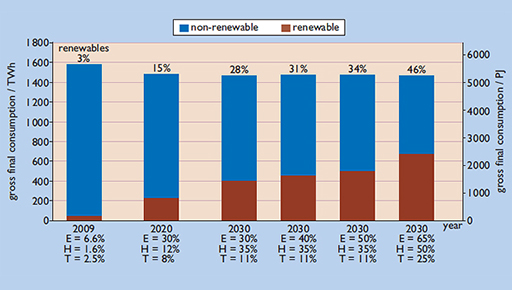7.1 Electricity market reform and new EU 2030 targets
In 2013 the UK Government passed an energy act introducing various electricity market reform measures, to take effect after 2015. These involve:
- setting ‘strike prices’ for generation from most renewables and other energy sources
- a ‘contracts for difference’ system to ensure that if the prevailing market price is lower than the strike price the difference will be topped up; equally, if the prevailing market price is higher than the strike price, the generator will have to repay the difference
- establishment of a 'capacity market' ensuring that sufficient generating capacity is available on standby in case other electricity generation is insufficient to meet demand.
In 2014 the EU decided on new targets, stipulating that by 2030:
- European carbon emissions should be reduced by 40%
- the contribution of renewable energy to EU supplies should reach 27%.
A target to achieve a 30% improvement in energy efficiency was also agreed, but not specific renewable energy targets for individual member countries, such as the UK.
However, the UK Committee on Climate Change in its 2011 report on Renewable Energy (CCC, 2011) envisaged four scenarios for UK renewables by 2030. As shown in Figure 13 it suggested that the renewable energy contribution could rise to:
- between 30% and 65% of electricity supplies
- between 35% and 50% of UK heat demand
- between 11% and 25% of transport energy needs.

Figure 13 also suggests that the total contribution of renewables to gross final consumption could be between 28% and 46%, and this, together with other similar analyses, suggests that the prospects for renewable energy in the coming decades look bright!
You will examine in more detail the future prospects for renewables in the UK, the EU and the world as a whole later in the course.
To conclude this week we look at a case study of a country that has adopted very ambitious renewable energy targets.
